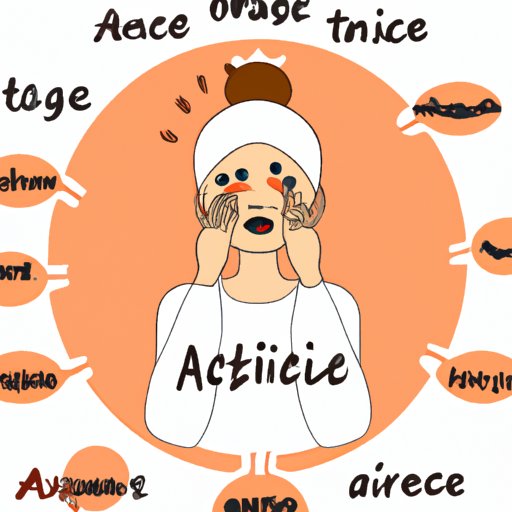Introduction
Acne is a skin condition that can occur at any age, but it’s especially common in adults. While there are many treatments for acne, understanding what causes adult acne can help you better manage the condition. In this article, we’ll explore the various causes of adult acne and provide tips for dealing with it.

Exploring the Causes of Adult Acne: A Comprehensive Guide
There are many potential causes of adult acne, including hormonal imbalances, stress, diet, environmental factors, and skincare products. Let’s take a closer look at each of these.
Hormonal Imbalances
Hormonal imbalances occur when the body produces too much or too little of certain hormones. These imbalances can cause a variety of skin issues, including adult acne.
Understanding Hormonal Imbalances and How They Lead to Adult Acne
What Are Hormonal Imbalances?
Hormonal imbalances occur when the body produces too much or too little of certain hormones. These hormones include estrogen, progesterone, testosterone, and cortisol. Hormonal imbalances can be caused by a variety of factors, such as stress, diet, lifestyle, and genetics.
How Do Hormonal Imbalances Affect Acne?
When the body produces too much of certain hormones, it can lead to an increase in sebum production. Sebum is an oily substance that helps keep your skin moisturized, but too much of it can clog pores and lead to acne. Hormonal imbalances can also trigger inflammation, which can further contribute to acne.

The Role of Stress in Causing Adult Acne
How Does Stress Contribute to Adult Acne?
Stress can affect the body in many ways, including triggering the release of hormones such as cortisol. When cortisol levels are elevated, it can lead to an increase in sebum production and inflammation, both of which can contribute to adult acne.
Tips for Reducing Stress-Related Acne
Managing stress is key to reducing stress-related acne. There are many different strategies you can use to reduce stress, such as relaxation techniques, exercise, meditation, yoga, and spending time with friends and family.

Uncovering the Impact of Diet on Adult Acne
How Can Diet Affect Acne?
Your diet can play an important role in managing adult acne. Eating a healthy, balanced diet that includes plenty of fresh fruits and vegetables can help reduce inflammation and improve skin health. Avoiding processed foods and refined sugars may also help reduce acne.
Foods That May Help Reduce Acne
Certain foods may help reduce acne. Incorporating more anti-inflammatory foods into your diet, such as salmon, olive oil, and nuts, may help reduce acne. Additionally, eating probiotic-rich foods such as yogurt, kefir, and kimchi can help balance gut bacteria and improve skin health.
Examining the Link Between Environmental Factors and Adult Acne
How Do Environmental Factors Contribute to Adult Acne?
Environmental factors such as air pollution, humidity, and extreme temperatures can all affect skin health. Pollution and high humidity levels can clog pores and lead to acne, while hot or cold weather can dry out the skin and make it more prone to breakouts.
Ways to Minimize Acne from Environmental Factors
Using a gentle cleanser to remove dirt and oil from your face can help minimize acne from environmental factors. Additionally, using a moisturizer with SPF can help protect your skin from the sun’s damaging rays. Lastly, wearing a hat and avoiding heavily polluted areas can also help reduce acne.
Assessing the Effects of Skincare Products on Adult Acne
How Do Skincare Products Affect Acne?
The skincare products you use can have a big impact on your skin health. Certain ingredients, such as those found in harsh cleansers, can strip the skin of its natural oils and lead to acne. Similarly, heavy creams and lotions can clog pores and cause breakouts.
Choosing the Right Skincare Products
To minimize the risk of adult acne, it’s important to choose the right skincare products. Look for products that are labeled “non-comedogenic” or “oil-free”, as these won’t clog pores. Additionally, opt for products that contain natural ingredients such as aloe vera and tea tree oil, as these can help soothe skin and reduce inflammation.
Conclusion
Adult acne can be caused by a variety of factors, such as hormonal imbalances, stress, diet, environmental factors, and skincare products. To reduce the risk of adult acne, it’s important to manage stress, eat a healthy diet, protect your skin from environmental factors, and choose the right skincare products. With the right approach, you can keep adult acne under control and maintain healthy skin.


